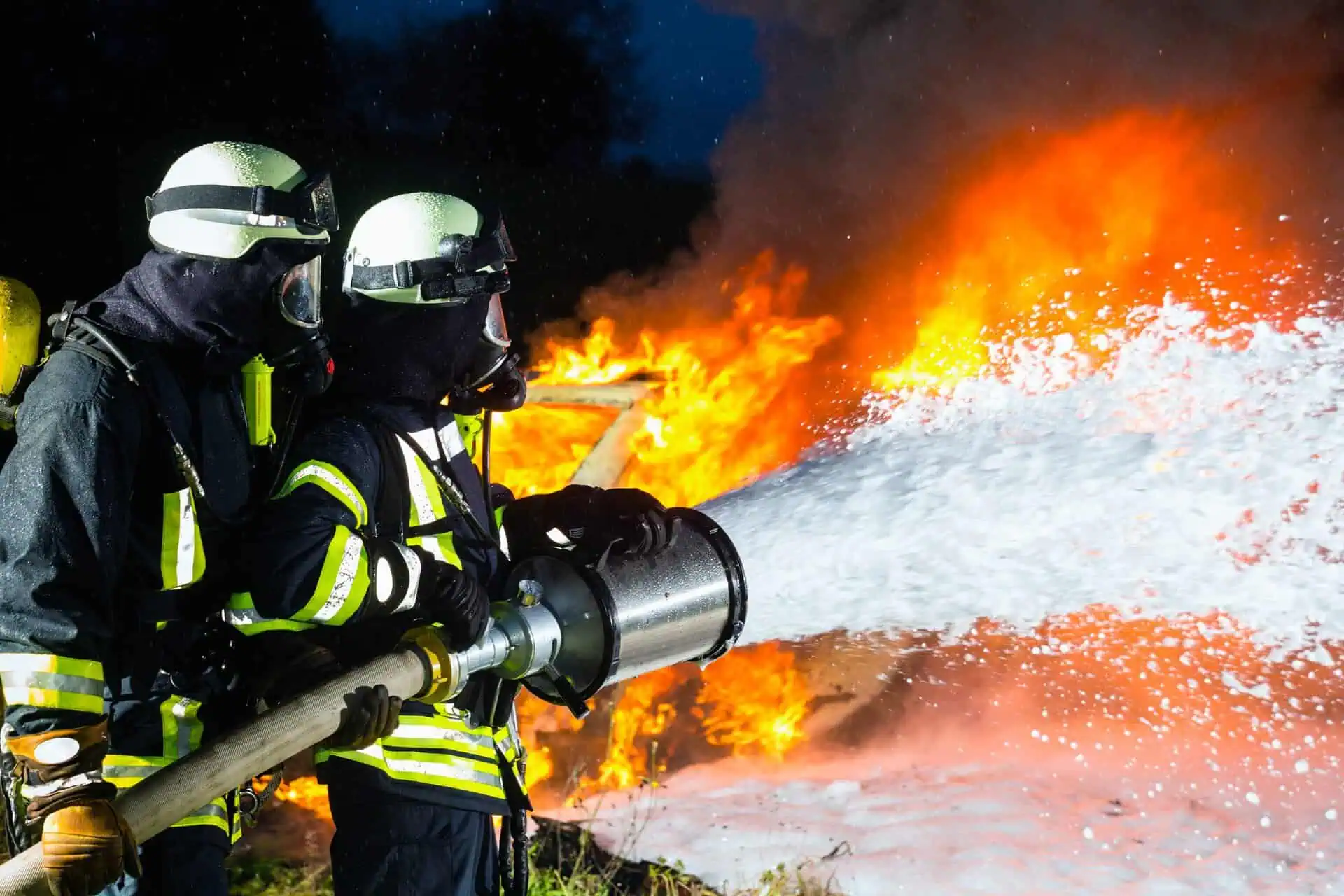AFFF Breast Cancer Lawsuit
- Last Updated: June 12th, 2025

Attorney Jessica Paluch-Hoerman, founder of TruLaw, has over 28 years of experience as a personal injury and mass tort attorney, and previously worked as an international tax attorney at Deloitte. Jessie collaborates with attorneys nationwide — enabling her to share reliable, up-to-date legal information with our readers.
Legally Reviewed
This article has been written and reviewed for legal accuracy and clarity by the team of writers and legal experts at TruLaw and is as accurate as possible. This content should not be taken as legal advice from an attorney. If you would like to learn more about our owner and experienced injury lawyer, Jessie Paluch, you can do so here.
Fact-Checked
TruLaw does everything possible to make sure the information in this article is up to date and accurate. If you need specific legal advice about your case, contact us by using the chat on the bottom of this page. This article should not be taken as advice from an attorney.
Key takeaways:
- Aqueous Film Forming Foam (AFFF), widely used since the 1960s to extinguish fires, contains PFAS chemicals linked to various health concerns, including breast cancer.
- Firefighters, military personnel, and industrial workers with regular contact with AFFF are at higher risk for health effects due to repeated exposure.
- If you or a loved one has been diagnosed with breast cancer or another cancer potentially tied to AFFF exposure, you may qualify to file an AFFF firefighting foam Lawsuit.
Overview of the AFFF Breast Cancer Lawsuit
On this page, we’ll discuss an overview of the AFFF Breast Cancer Lawsuit, potential AFFF lawsuit settlement amounts, who qualifies to file an AFFF lawsuit, and much more.
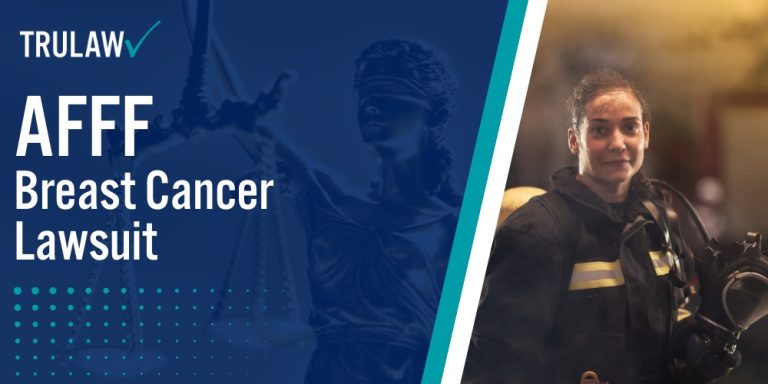
Intro to the AFFF Breast Cancer Lawsuits
Aqueous Film Forming Foam (AFFF) has been widely used since the 1960s in industries that need to extinguish fires fueled by liquids or gases.
AFFF contains PFAS chemicals, often referred to as “forever chemicals,” which have been linked to various health concerns, including breast cancer and other forms of cancer.
Across the country, lawsuits related to AFFF exposure are being filed by individuals who have suffered health issues potentially caused by contact with these chemicals.
If you or a loved one has been diagnosed with breast cancer or another cancer potentially tied to AFFF exposure, you may qualify to pursue legal action.
You can use the chatbot on this page to instantly determine if you may be eligible to file an AFFF lawsuit.
Our team is available to answer any questions you may have about your potential claim and guide you through the next steps.
If you believe you have been affected by AFFF exposure, don’t hesitate to reach out and learn more about how we can assist.
Table of Contents
PFAS Chemical Exposure and Breast Cancer Risk
Exposure to PFAS chemicals found in AFFF firefighting foam has been associated with an increased risk of developing breast cancer and other serious health conditions.
Research has shown that certain PFAS chemicals, often referred to as “forever chemicals,” may be linked to elevated cancer risks, including breast cancer.
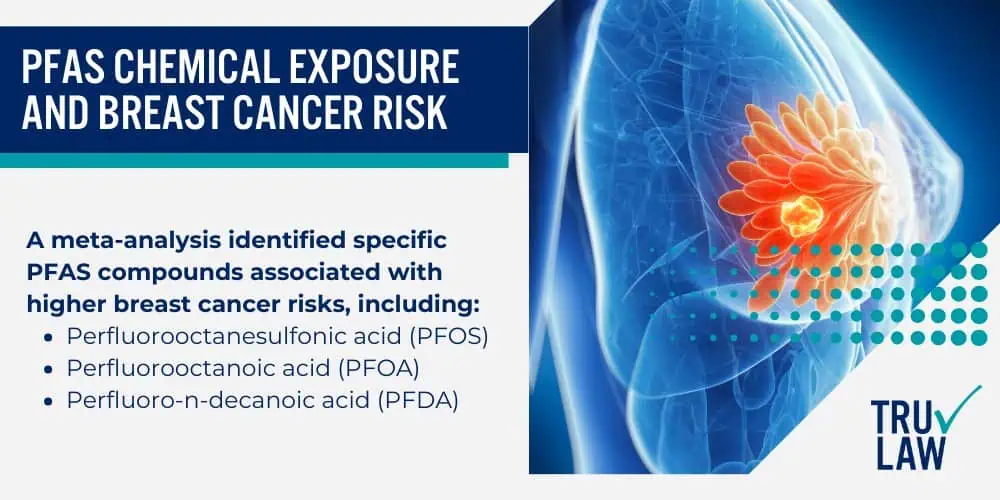
A meta-analysis identified specific PFAS compounds associated with higher breast cancer risks, including:
- Perfluorooctanesulfonic acid (PFOS)
- Perfluorooctanoic acid (PFOA)
- Perfluoro-n-decanoic acid (PFDA)
In another study conducted by researchers at the University of California, Berkeley, female firefighters in San Francisco were found to have a higher risk of health effects from PFAS exposure compared to women in other professions.
This highlights the potential dangers of long-term exposure to these chemicals, particularly in firefighting professions.
Common symptoms of breast cancer to watch for include, but are not limited to:
- Changes in the size or shape of the breast
- Pain or pulling in of the nipple
- Thickening or swelling in part of the breast
- Nipple discharge that isn’t breast milk (including blood)
- Redness or flaky skin near the nipple or breast area
- A new lump in the breast or underarm area
- Pain in any part of the breast
- Irritation or dimpling of the skin on the breast
Ongoing Research on PFAS Chemicals and Cancer Risks
Ongoing research continues to link PFAS chemicals, like PFOA and PFOS, to increased cancer risks.
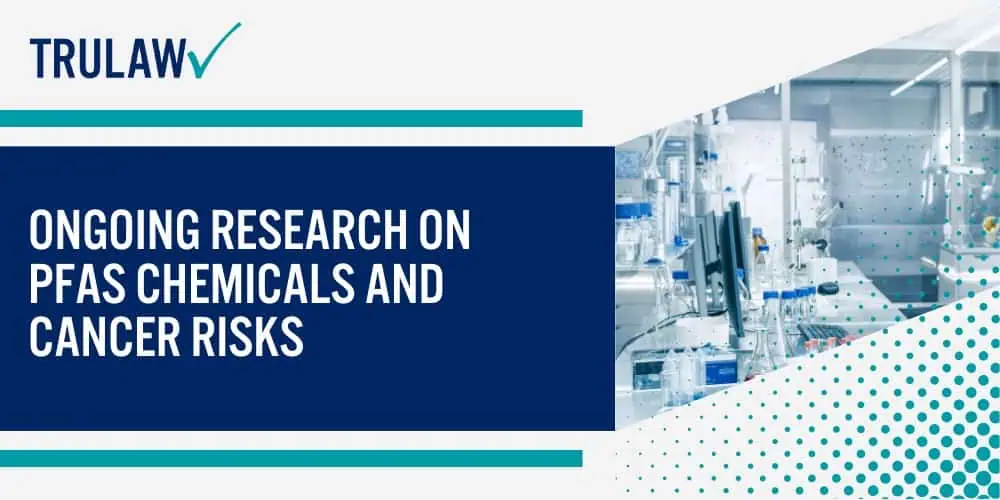
Several studies have shed light on the dangers of long-term exposure to these substances:
- The International Agency for Research on Cancer (IARC) has classified PFOA as carcinogenic to humans (Group 1) and classified PFOS as possibly carcinogenic to humans (Group 2B).
- A study published by the Journal of the American Medical Association found a link between PFOA exposure and increased risks of kidney cancer, testicular cancer, and ulcerative colitis.
- The U.S. Environmental Protection Agency (EPA) has issued a health advisory, warning that long-term exposure to PFOA and PFOS above certain levels could harm human health. As a result, in 2024, the EPA announced the National Primary Drinking Water Regulation (NPDWR) for six (6) PFAS chemicals — establishing legally enforceable Maximum Contaminant Levels (MCLs) that water systems must test and confirm are met before distributing drinking water to the public.
- Research published in the International Journal of Cancer highlighted a positive association between PFOS exposure and breast cancer.
While the evidence linking PFAS exposure to cancer is growing, further studies are needed to understand the long-term health effects of these chemicals fully.
Firefighting Foam Cancer Lawsuits
Several companies are currently facing AFFF firefighting foam lawsuits over toxic chemicals found in AFFF firefighting foam products, which have been linked to cancer and other serious health conditions.
Many of these products contain PFAS chemicals, often referred to as “forever chemicals” due to their persistence in the environment and the human body.
Both the Centers for Disease Control and Prevention (CDC) and the Environmental Protection Agency (EPA) have issued warnings regarding the dangers of AFFF firefighting foams, cautioning that exposure to PFAS chemicals may contribute to a range of health risks.
These PFAS chemicals do not break down over time, and prolonged exposure has been associated with an increased risk of cancers such as bladder, prostate, testicular, and kidney cancer, as well as other serious health problems.
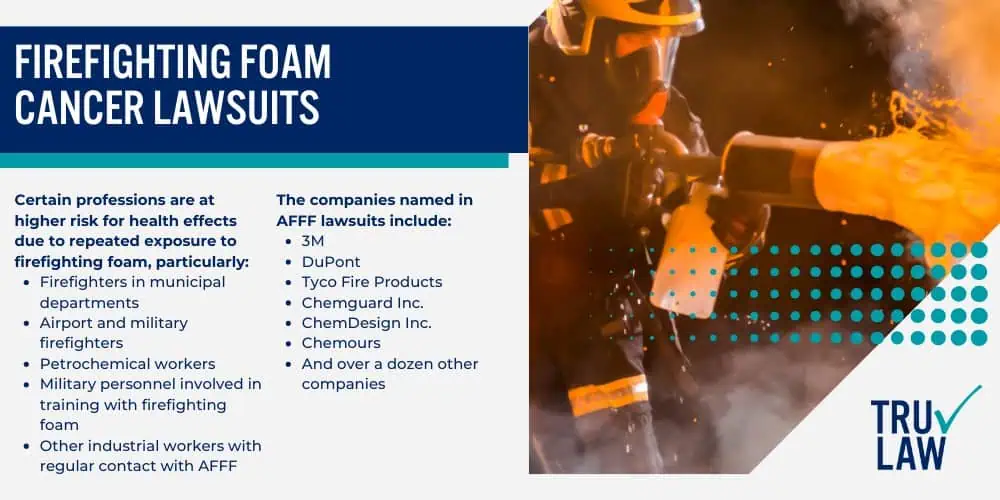
Certain professions are at higher risk for health effects due to repeated exposure to firefighting foam, particularly:
- Firefighters in municipal departments
- Airport and military firefighters
- Petrochemical workers
- Military personnel involved in training with firefighting foam
- Other industrial workers with regular contact with AFFF
The companies named in AFFF lawsuits include:
- 3M
- DuPont
- Tyco Fire Products
- Chemguard Inc.
- ChemDesign Inc.
- Chemours
- And over a dozen other companies
Latest Updates on Firefighting Foam Lawsuits
Currently, firefighting foam lawsuits are being managed through multidistrict litigation (MDL).
There are over 4,000 individual AFFF lawsuits pending in the AFFF firefighting foam MDL, and the number continues to grow.
Though AFFF manufacturers have made attempts to dismiss the claims against them, the AFFF firefighting foam lawyers at TruLaw and our partner law firms remain optimistic about the cases moving forward.
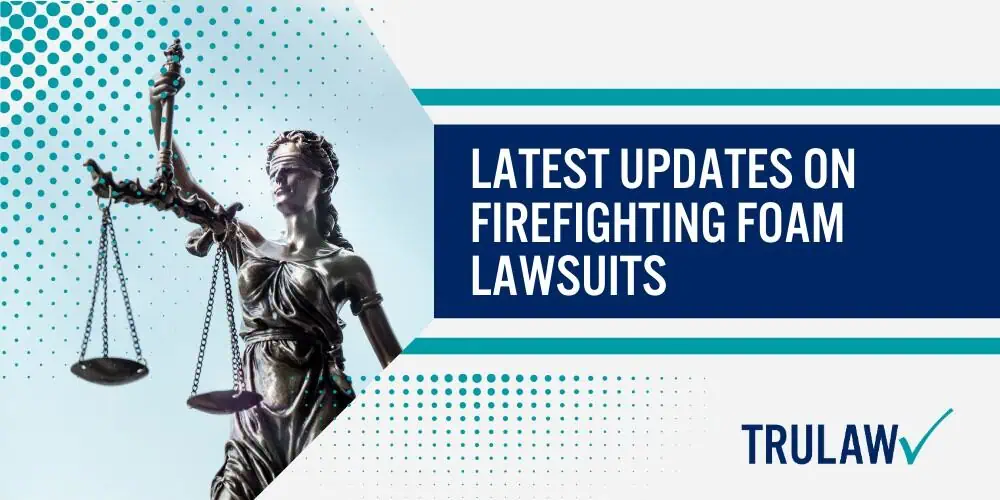
If you believe you or a loved one may have been affected by exposure to PFAS chemicals in firefighting foam, we encourage you to reach out to TruLaw to discuss the specifics of your case.
You can use the chat on this page for an instant case evaluation to quickly see if you qualify for an AFFF lawsuit.
Settlement Amounts in Firefighting Foam Lawsuits
At this stage, it is too early to determine the average settlement amounts for AFFF lawsuits.
However, based on similar cases involving PFAS contamination, firefighting foam attorneys estimate that potential settlements could range between $20,000 and $600,000 (or more).
These figures are simply projections based on past cases and do not guarantee any specific financial compensation in the AFFF litigation.
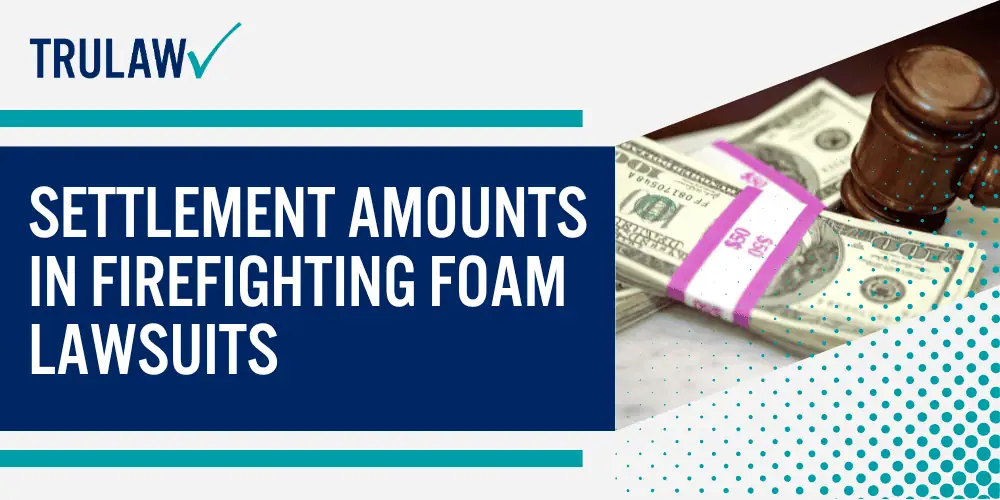
As the legal proceedings progress, we will continue to gather more information, which will give us a clearer picture of potential settlement outcomes.
For now, our focus is on staying informed as the litigation develops and ensuring clients receive the attention their AFFF firefighting foam cases deserve.
Toxic Firefighting Foam Contamination in Drinking Water and Groundwater
Aqueous Film Forming Foam (AFFF) has had a harmful environmental impact, particularly in relation to water contamination.
AFFF is a major contributor to PFAS pollution in drinking water, as the chemicals are highly soluble and can easily spread through water sources.
The Department of Ecology from the State of Washington recently stated that AFFF is not only a major cause of PFAS contamination in drinking water — AFFF is the leading cause of PFAS contamination in drinking water.
When used in large quantities to contain dangerous fires, AFFF can leak into surrounding areas, contaminating both groundwater and drinking water.
While many lawsuits have been filed by state governments, water districts, and local agencies over this environmental contamination, these actions focus on holding manufacturers accountable.
These legal actions represent a collective effort to address the widespread impact of AFFF contamination on water supplies.
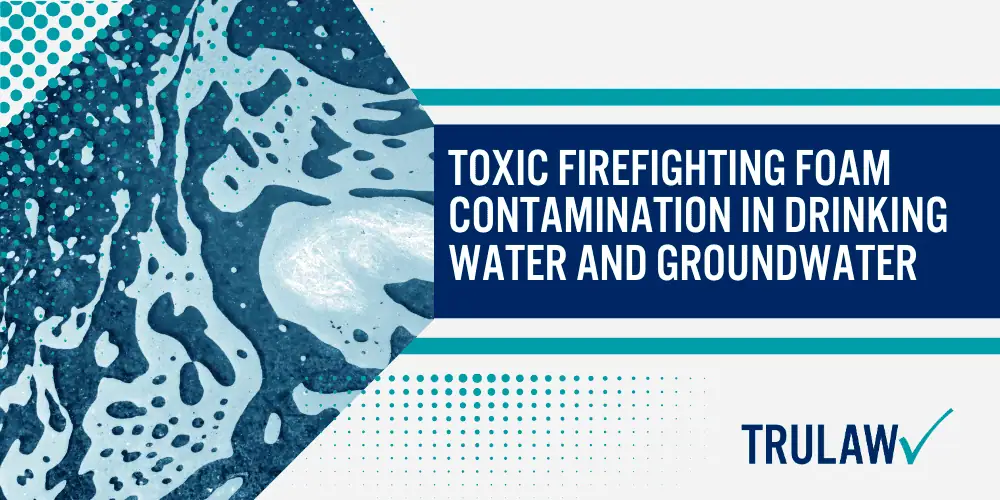
Several states and water districts joined the AFFF litigation against AFFF manufacturers, these include:
- State of New Hampshire
- State of Ohio
- State of Michigan
- State of Vermont
- City of Philadelphia, Pennsylvania
- City of Birmingham, Alabama
- City of Thornton, Colorado
- City of Baltimore, Maryland
- City of Pittsboro, North Carolina
- City of Fairbanks, Alaska
- City of La Crosse, Wisconsin
- City of Peshtigo, Wisconsin
- The Water Replenishment District of Southern California
- The Commonwealth of Massachusetts
- Various additional cities and local water agencies
It’s important to note that TruLaw is only accepting clients with AFFF personal injury claims — we are not accepting clients for the AFFF municipal water contamination lawsuits.
Efforts to Limit AFFF Exposure and Use
In light of increasing concerns over the environmental and health risks associated with AFFF, numerous organizations and agencies are working to reduce and eventually eliminate the use of PFAS-containing firefighting foam.
These initiatives include transitioning to safer alternatives and phasing out AFFF entirely.
The Pentagon has been leading these efforts, announcing the development of new PFAS-free firefighting foam products intended for military use.
These alternatives, free of harmful PFAS chemicals, are expected to be implemented in the near future.
Similarly, the Federal Aviation Administration is actively researching replacements for AFFF in airports nationwide, focusing on safer, PFAS-free formulas.
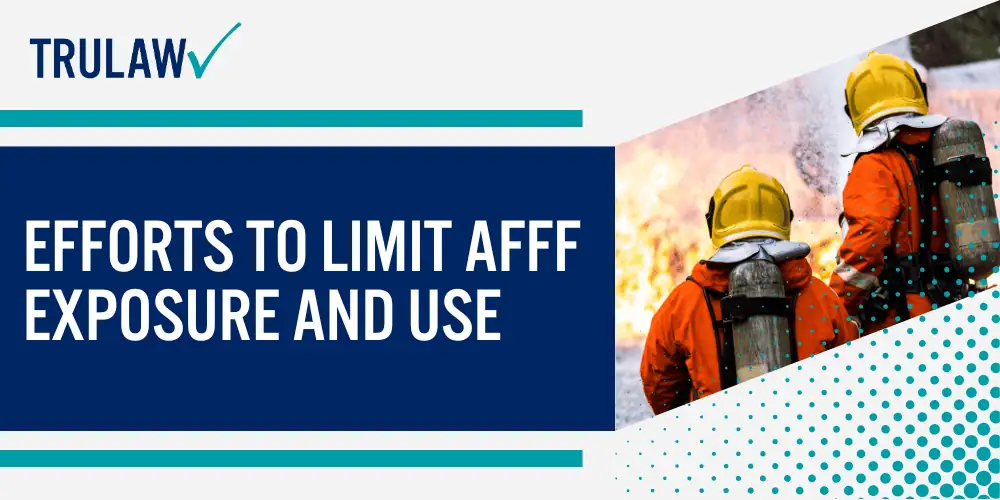
The U.S. Department of Defense has also laid out a roadmap to phase out AFFF, with advancements in firefighting technologies introduced in 2022.
These collective efforts reflect an increasing commitment to addressing the dangers posed by PFAS, working toward reducing exposure and safeguarding public health.
Filing an AFFF Breast Cancer Lawsuit
If you or a loved one have been exposed to PFAS chemicals from Aqueous Film Forming Foam (AFFF) and developed cancer or related health conditions, you may be eligible to seek compensation through an AFFF lawsuit.
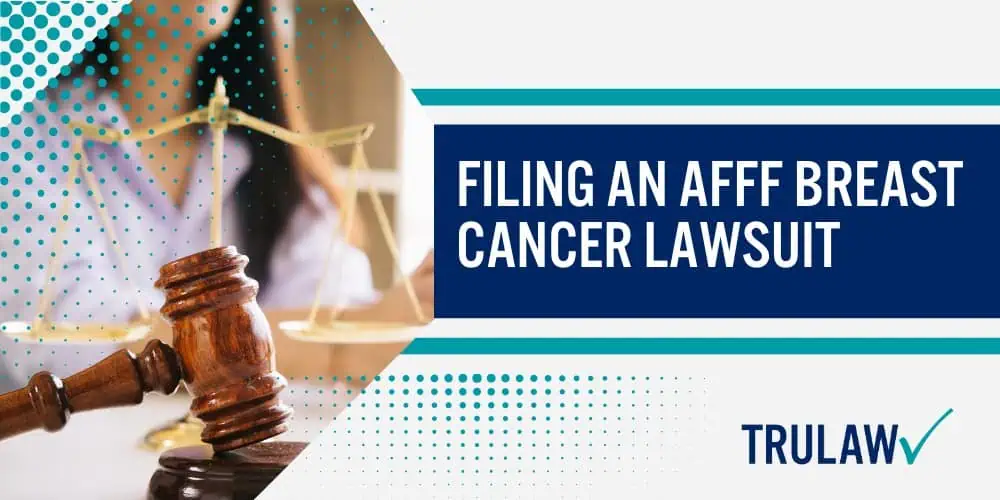
To explore your options, reach out to us for more information by using the chat on this page for an instant case evaluation and quickly find out if you may qualify to file an AFFF lawsuit.
Collecting Evidence for AFFF Firefighting Foam Lawsuits
Gathering sufficient evidence is a key step in filing an AFFF lawsuit.
The AFFF lawyers at TruLaw and our partner law firms will assist in determining which types of evidence are necessary to support your claim.
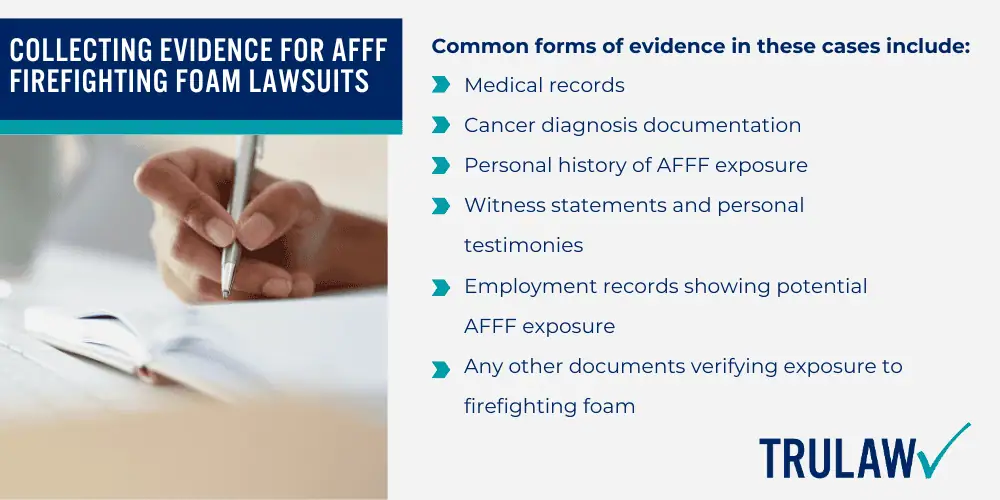
Common forms of evidence in these cases include:
- Medical records
- Cancer diagnosis documentation
- Personal history of AFFF exposure
- Witness statements and personal testimonies
- Employment records showing potential AFFF exposure
- Any other documents verifying exposure to firefighting foam
Compensation for Damages in Firefighting Foam Lawsuits
Damages in an AFFF cancer lawsuit refer to the various losses, both economic and non-economic, experienced as a result of PFAS exposure.
AFFF lawyers will help assess your damages and calculate a demand for compensation from the responsible parties.
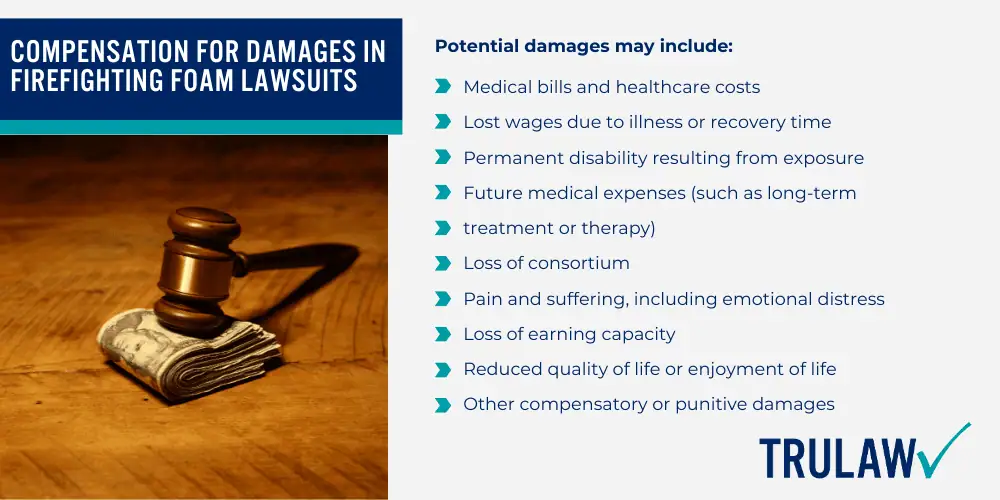
Potential damages may include:
- Medical bills and healthcare costs
- Lost wages due to illness or recovery time
- Permanent disability resulting from exposure
- Future medical expenses (such as long-term treatment or therapy)
- Loss of consortium
- Pain and suffering, including emotional distress
- Loss of earning capacity
- Reduced quality of life or enjoyment of life
- Other compensatory or punitive damages
Importance of Hiring Experienced Firefighting Foam Attorneys for Your Claim
Choosing the right legal team is an important decision when pursuing an AFFF claim.
The AFFF lawyers at TruLaw and our partner law firms, are dedicated to ensuring that clients receive thorough and compassionate legal support.
AFFF lawsuits often involve life-altering conditions, such as cancer and other serious health issues.
We understand the challenges that arise from these hardships, and TruLaw is committed to protecting your best interests throughout the process.
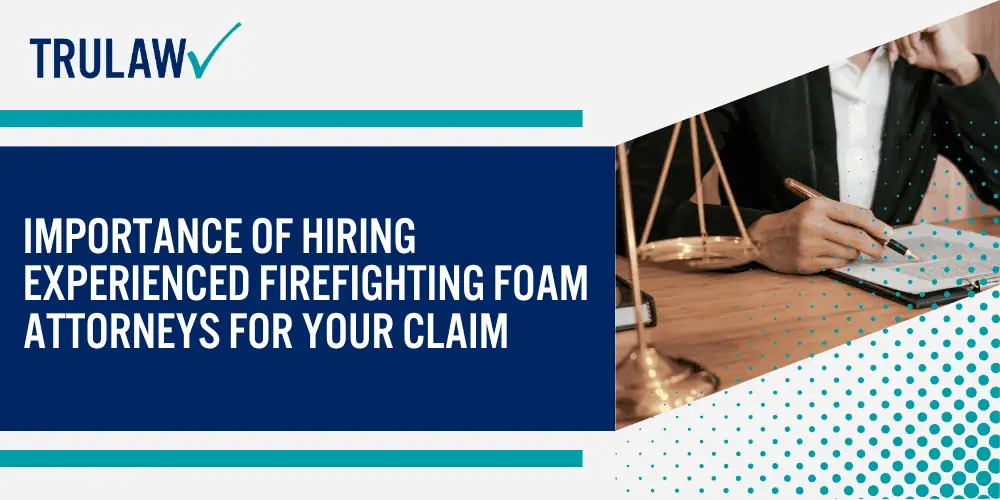
When deciding on legal representation for your AFFF claim, it’s important to select attorneys who will advocate for your right to fair compensation and guide you through every step of the litigation process.
Use the chat on this page for an instant case evaluation to quickly determine if you qualify to file an AFFF lawsuit.
TruLaw: Your Firefighting Foam Cancer Law Firm
TruLaw is dedicated to helping individuals explore their legal options for damages they’ve endured due to AFFF exposure.
Firefighting foam containing PFAS chemicals has been linked to serious health risks, including various types of cancer.
If you or a loved one has experienced health issues after regular exposure to firefighting foam, you may be eligible to file a claim for compensation.
We encourage you to reach out to us with any questions about your potential case.
Our team is here to guide you through the process — you can use the chat on this page for an instant case evaluation to quickly determine if you qualify to file an AFFF lawsuit.
AFFF Lawsuit Frequently Asked Questions
-
What are PFAS chemicals?
PFAS (Per- and Polyfluoroalkyl Substances) are a group of synthetic chemicals used in various industries because of their resistance to heat, water, oil, and stains.
These properties have made PFAS common in everyday products like firefighting foam, non-stick cookware, and water-repellent fabrics.
Unfortunately, PFAS chemicals are known to persist in the environment and can accumulate in the human body over time.
Exposure to these chemicals has been linked to potential health risks, including cancer, immune system issues, and developmental defects.
Due to these concerns, the use of PFAS is being restricted or banned in several states and countries as awareness of their dangers continues to grow.
-
What is Aqueous Film Forming Foam (AFFF)?
Aqueous Film Forming Foam (AFFF) is a firefighting foam commonly used to suppress fires, particularly those involving flammable liquids, such as jet fuel.
It works by creating a film that separates the fuel from the oxygen, helping to extinguish fires quickly and effectively.
AFFF has been widely used in industries such as aviation, military, and petrochemical since the 1960s.
Companies like 3M, Chemguard, and Tyco Fire Products have been leading manufacturers of AFFF, supplying it globally for decades.
While AFFF has been a valuable tool for firefighting, concerns have arisen over its connection to PFAS chemicals, which have been linked to environmental and health risks.
-
What products are PFAS chemicals found in?
In addition to being a key component in firefighting foam, PFAS chemicals are found in many everyday products due to their water, stain, and heat-resistant properties.
These products include, but are not limited to:
- Nonstick cookware
- Microwave popcorn bags
- Personal care items, like shampoo, dental floss, nail polish, and makeup
- Grease-resistant paper and food packaging
- Some plastic wrappers and bottles
- Cleaning products
- Water-resistant fabrics, such as rain jackets, umbrellas, and tents
- Stain-resistant treatments on carpets, upholstery, and other textiles
As awareness grows about the potential risks of PFAS exposure, there is increasing scrutiny of their presence in consumer goods.
-
Who is at risk for exposure to firefighting foam?
Individuals at risk for exposure to firefighting foam are typically those whose work involved handling or being in close contact with these products.
Firefighting foam, particularly AFFF (Aqueous Film Forming Foam), contains PFAS chemicals, which can pose serious health risks when individuals are exposed over time.
Another potential route of exposure is through contaminated drinking water in areas where firefighting foam was used extensively.
Those most likely to experience occupational exposure to PFAS in firefighting foam include:
- Firefighters at airports and military bases
- Municipal firefighters
- Workers in industrial settings like oil refineries
- Personnel who worked on flight decks
- Employees of AFFF manufacturers
- Workers involved in transporting AFFF firefighting foam
- Employees at incineration facilities tasked with disposing of firefighting foam
These groups are considered at higher risk due to the nature of their jobs and prolonged exposure to AFFF products.
-
What health problems may AFFF firefighting foam be linked to?
Exposure to PFAS chemicals found in AFFF (Aqueous Film-Forming Foam) may be associated with various health risks.
These chemicals have been the subject of growing concern due to their potential to accumulate in the body over time.
Possible health conditions that may be linked to PFAS exposure include:
- Bladder cancer
- Ulcerative colitis
- Endometrial cancer
- Pancreatic cancer
- Testicular cancer
- Non-Hodgkin’s lymphoma
- Kidney cancer
- Heart disease
- Thyroid disease
- Thyroid cancer
- Breast cancer
- Liver cancer
- Leukemia
- Colorectal cancer
- Mesothelioma
- Ovarian cancer
- Prostate cancer
- Birth defects
- Hormonal imbalances
As research into PFAS continues, additional health issues may be identified, and it is important to remain aware of the potential risks associated with exposure to these chemicals.
-
Who are the defendants in AFFF lawsuits?
The defendants in AFFF lawsuits are companies that manufactured and supplied firefighting foam containing PFAS chemicals to organizations (such as fire departments, military bases, and airports).
These companies are being held accountable for their role in distributing products that may have contributed to PFAS contamination.
Companies named in these AFFF cancer lawsuits include:
- Tyco Fire Products
- Chemguard Inc.
- 3M
- DuPont
- Chemours
- ChemDesign Inc.
- Several other manufacturers and suppliers
These lawsuits aim to address the environmental and health impacts associated with exposure to AFFF products containing PFAS.
-
What is the AFFF MDL?
The AFFF MDL, or Multidistrict Litigation, was established in the U.S. District Court for the District of South Carolina.
This legal process is used to streamline individual AFFF injury claims, like those involving firefighting foam (AFFF), by consolidating similar lawsuits into one court for pretrial proceedings.
When many individuals file separate lawsuits after being affected by the same issue, the federal court may consolidate these cases into an MDL to manage them more efficiently.
This helps to address the shared legal and factual questions involved in these cases in a more organized manner.
You may see some law firms refer to this as the AFFF firefighting foam class action lawsuit — this is incorrect.
While they are similar, class action lawsuits and multidistrict litigations are distinctly different.
The main difference being that a class action lawsuit involves claimants equally sharing an awarded settlement or verdict — whereas, in an MDL, claimants are awarded different settlements based on the damages that apply to their unique case.
-
How can firefighting foam lawyers help me?
The AFFF firefighting foam lawyers at TruLaw and our partner law firms are here to guide you through the legal process if you’ve been exposed to firefighting foam containing PFAS.
Our legal professionals can assist you with several key aspects of your case, including but not limited to:
- Collecting and organizing evidence related to your AFFF exposure.
- Identifying liable parties who may be responsible for your cancer diagnosis or other health complications.
- Providing clarity on the legal process and addressing your questions as your case progresses.
- Striving to achieve a fair settlement for those impacted by AFFF exposure.
- Evaluating the potential damages tied to your exposure, such as medical expenses and long-term health effects.
Our goal is to help you through the legal process as you seek compensation for the harms caused by firefighting foam exposure.
-
How much does it cost to hire a firefighting foam attorney?
The firefighting foam attorneys at TruLaw and our partner law firms operate on a contingency fee basis.
This means that you won’t pay any upfront legal fees for representation in your firefighting foam lawsuit.
Instead, legal fees are only collected if your case reaches a successful settlement or verdict.
If no settlement or compensation is awarded in your AFFF lawsuit, you won’t owe any legal fees.
This approach ensures that pursuing your claim comes with no financial risk upfront.

Managing Attorney & Owner
With over 25 years of legal experience, Jessica Paluch-Hoerman is an Illinois lawyer, a CPA, and a mother of three. She spent the first decade of her career working as an international tax attorney at Deloitte.
In 2009, Jessie co-founded her own law firm with her husband – which has scaled to over 30 employees since its conception.
In 2016, Jessie founded TruLaw, which allows her to collaborate with attorneys and legal experts across the United States on a daily basis. This hypervaluable network of experts is what enables her to share the most reliable, accurate, and up-to-date legal information with our readers!
Additional AFFF Lawsuit resources on our website:
Here, at TruLaw, we’re committed to helping victims get the justice they deserve.
Alongside our partner law firms, we have successfully collected over $3 Billion in verdicts and settlements on behalf of injured individuals.
Would you like our help?
At TruLaw, we fiercely combat corporations that endanger individuals’ well-being. If you’ve suffered injuries and believe these well-funded entities should be held accountable, we’re here for you.
With TruLaw, you gain access to successful and seasoned lawyers who maximize your chances of success. Our lawyers invest in you—they do not receive a dime until your lawsuit reaches a successful resolution!
AFFF Lawsuit claims are being filed against manufacturers of aqueous film-forming foam (AFFF), commonly used in firefighting.
Claims allege that companies such as 3M, DuPont, and Tyco Fire Products failed to adequately warn users about the potential dangers of AFFF exposure — including increased risks of various cancers and diseases.
Depo Provera Lawsuit claims are being filed by individuals who allege they developed meningioma (a type of brain tumor) after receiving Depo-Provera birth control injections.
A 2024 study found that women using Depo-Provera for at least 1 year are five times more likely to develop meningioma brain tumors compared to those not using the drug.
Suboxone Tooth Decay Lawsuit claims are being filed against Indivior, the manufacturer of Suboxone, a medication used to treat opioid addiction.
Claims allege that Indivior failed to adequately warn users about the potential dangers of severe tooth decay and dental injuries associated with Suboxone’s sublingual film version.
Social Media Harm Lawsuits are being filed against social media companies for allegedly causing mental health issues in children and teens.
Claims allege that companies like Meta, Google, ByteDance, and Snap designed addictive platforms that led to anxiety, depression, and other mental health issues without adequately warning users or parents.
Transvaginal Mesh Lawsuits are being filed against manufacturers of transvaginal mesh products used to treat pelvic organ prolapse (POP) and stress urinary incontinence (SUI).
Claims allege that companies like Ethicon, C.R. Bard, and Boston Scientific failed to adequately warn about potential dangers — including erosion, pain, and infection.
Bair Hugger Warming Blanket Lawsuits involve claims against 3M — alleging their surgical warming blankets caused severe infections and complications (particularly in hip and knee replacement surgeries).
Plaintiffs claim 3M failed to warn about potential risks — despite knowing about increased risk of deep joint infections since 2011.
Baby Formula NEC Lawsuit claims are being filed against manufacturers of cow’s milk-based baby formula products.
Claims allege that companies like Abbott Laboratories (Similac) and Mead Johnson & Company (Enfamil) failed to warn about the increased risk of necrotizing enterocolitis (NEC) in premature infants.
Here, at TruLaw, we’re committed to helping victims get the justice they deserve.
Alongside our partner law firms, we have successfully collected over $3 Billion in verdicts and settlements on behalf of injured individuals.
Would you like our help?
